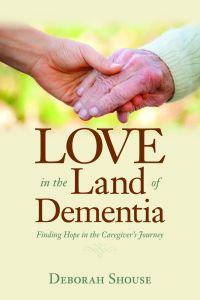 Deborah Shouse is one of my writer friends and mentors. For many years, Deborah has written and spoken about being a caregiver and advocate for Alzheimer’s patients.
Deborah Shouse is one of my writer friends and mentors. For many years, Deborah has written and spoken about being a caregiver and advocate for Alzheimer’s patients.
She is the author of Love in the Land of Dementia: Finding Hope in the Caregiver’s Journey (Central Recovery Press Nov 2013). Her blog, Deborah Shouse Writes, focuses on finding the gifts, blessings and connections in the care partner’s journey through Alzheimer’s.
Deborah has kindly given me permission to use one of her blog posts, which deals with the all too common problem of handling the repeated stories that Alzheimer’s patients tell. Anyone who has been close to someone suffering from dementia can relate to this issue. But few can handle it with the grace and creativity that Deborah shows.
* * *
Pretend you are editing a story, acting in a play or practicing for a concert.
You go over the same material again and again, seeking nuances, sinking deeper into the art form, hoping to find additional meaning. You integrate the piece into your heart and mind.
Imagine what would happen if you could bring that same set of creative thinking to the story your memory-impaired father just told you for the 112th time!
Listen in a New Way
That was my task during a particularly repetitive period in my mother’s Alzheimer’s: learning to appreciate each telling of the same tale, knowing the story was an important part of Mom’s life and that later, the story might disappear.
My friends Meg and Jim helped me by saying, “We loved sitting by your mom and hearing her WWII stories. She was really courageous.”
I felt a flash of pride and a flush of shame; those were the very stories I was so weary of.
I decided to listen to her stories in a new way, seeing what I could learn about Mom from careful, loving listening. I challenged myself, asking these questions:
What does the story say about my mom?
As I listened anew to Mom’s story of serving as an Army nurse in Iceland, living in a Quonset hut and skiing over to nearby hot springs, I practiced seeing Mom as my friends had seen her—an adventurous, patriotic, curious, and caring person. I realized I had started taking these qualities for granted!
How can I use the story to build a conversation with Mom?
From studying creative people, I realized that embracing limitations can actually inspire creativity. “We need to first be limited in order to become limitless,” says artist Phil Hansen. Filmmaker Martin Villeneuve says, “If you treat the problems as possibilities, life will start to dance with you in the most amazing ways.”
There’s an art in coloring inside the box. I experimented:
- How many times could I answer the same question in a different and interesting way?
- How often could I ask a new question about a familiar story?
- What unique comments might lead us to another conversation?
How can I use the story to connect Mom to others?
Sharing the story meant sharing the marvelous qualities of my mom and celebrating her rich history. I wrote down her oft-repeated story and sent it to my relatives. When friends asked me how Mom was doing, I told them and I added in the story. This widened and enriched our conversation, taking the focus away from Alzheimer’s and concentrating on my mom’s stellar qualities.
* * *
I highly recommend Deborah’s book, Love in the Land of Dementia: Finding Hope in the Caregiver’s Journey (Central Recovery Press Nov 2013). To buy it, visit your local bookseller or favorite online retailer. Here are the links to the book on Amazon and on Barnes & Noble.
To learn more about Deborah’s work, you can also visit her blog, Deborah Shouse Writes. Or follow her on Twitter: @DeborahShouse
